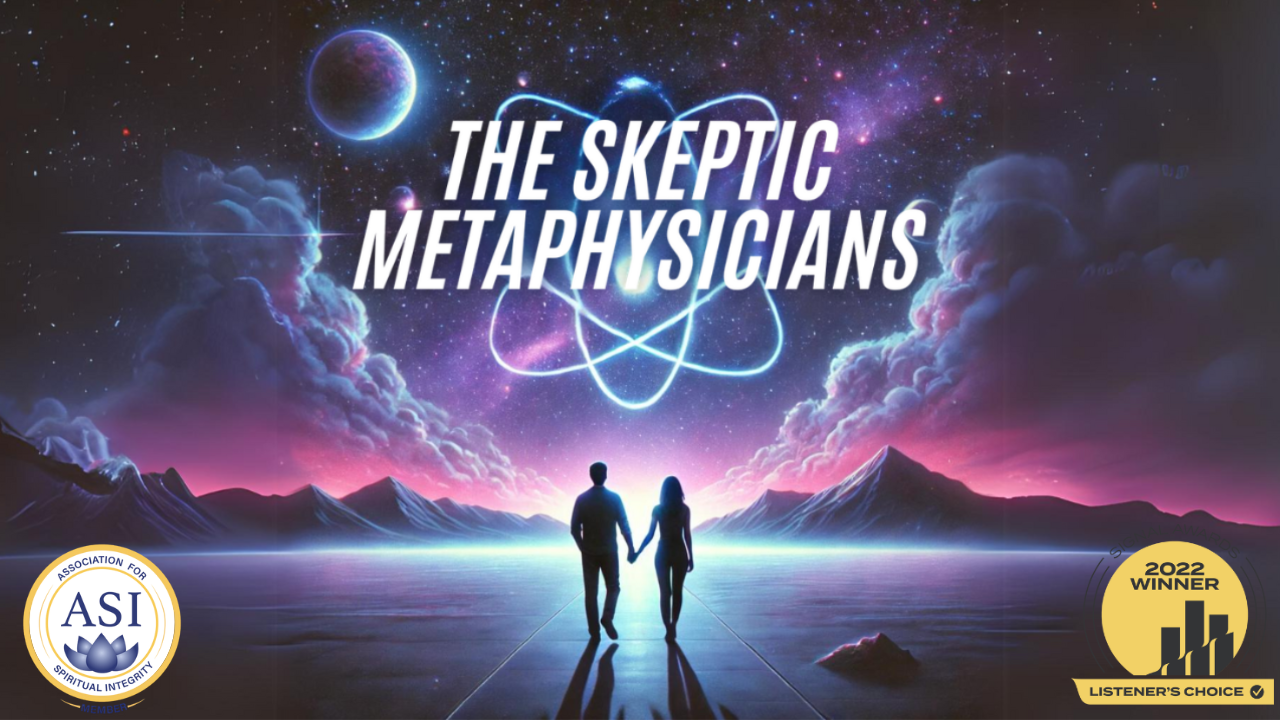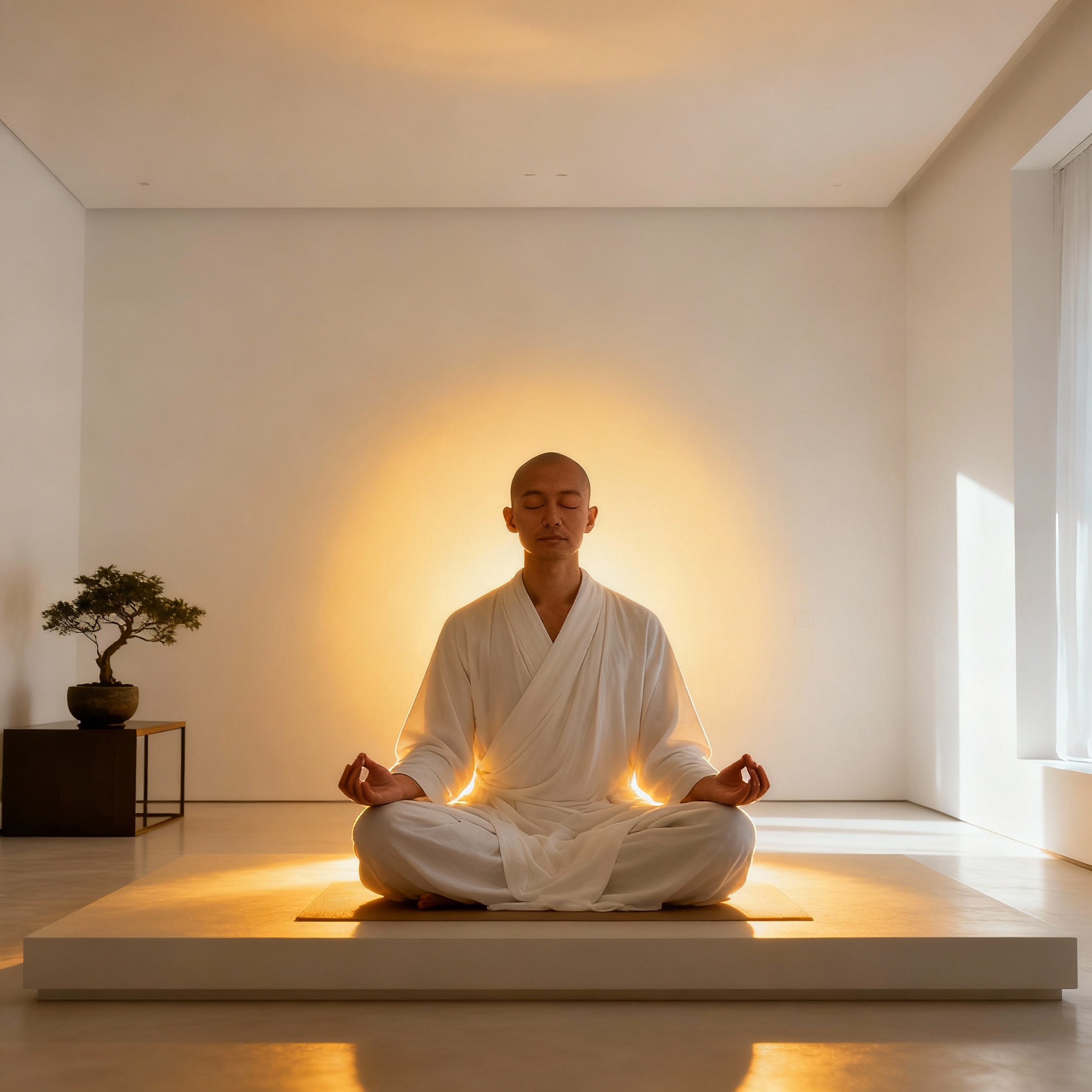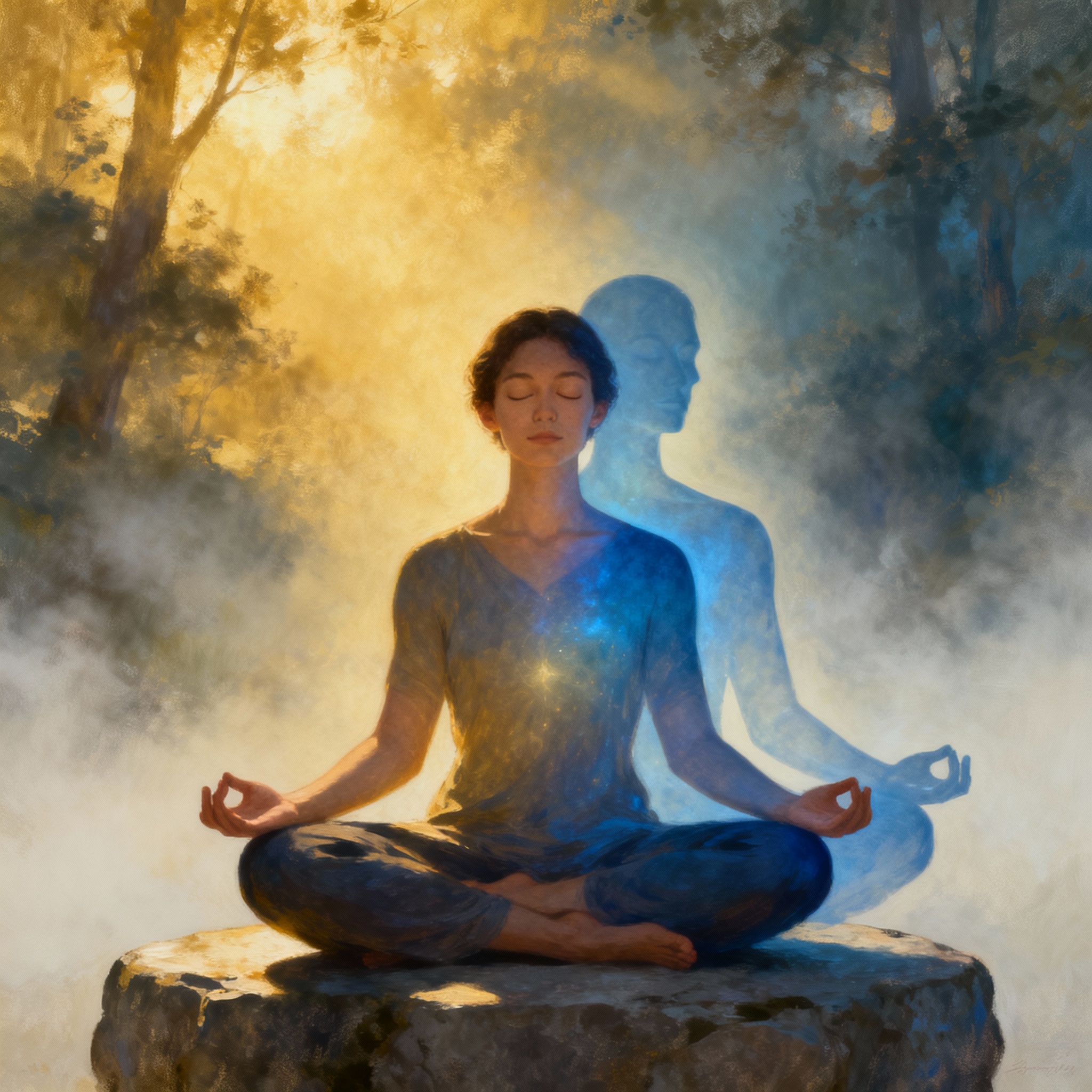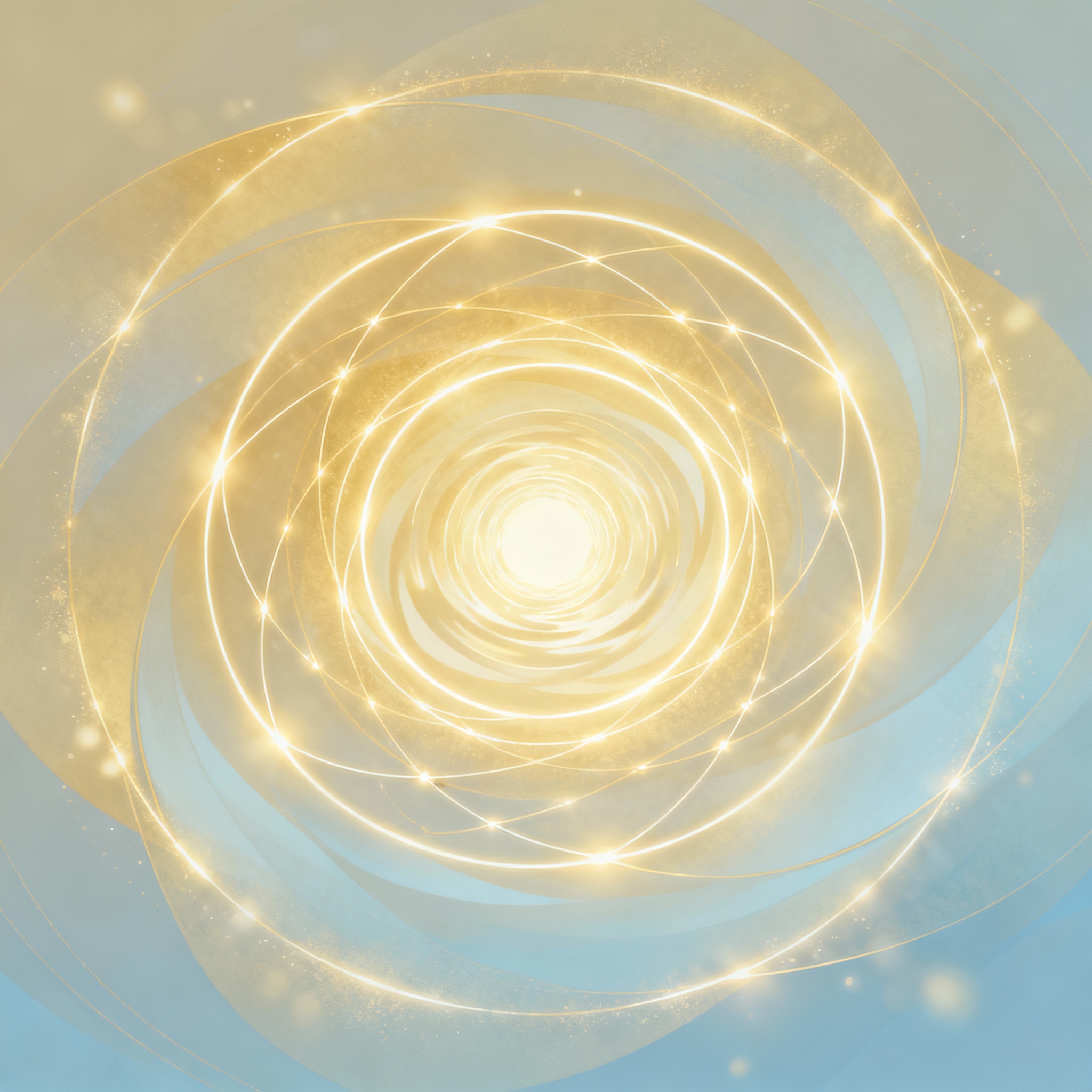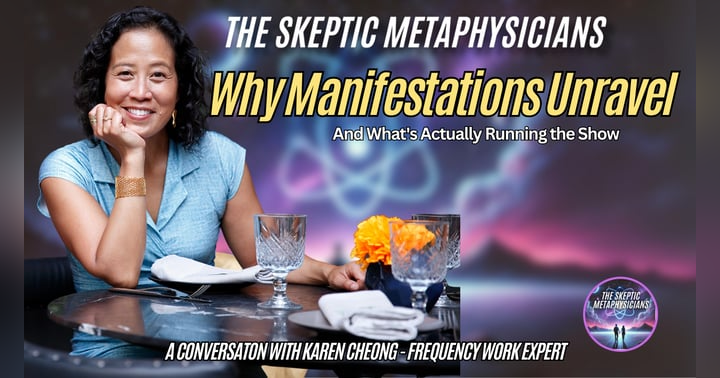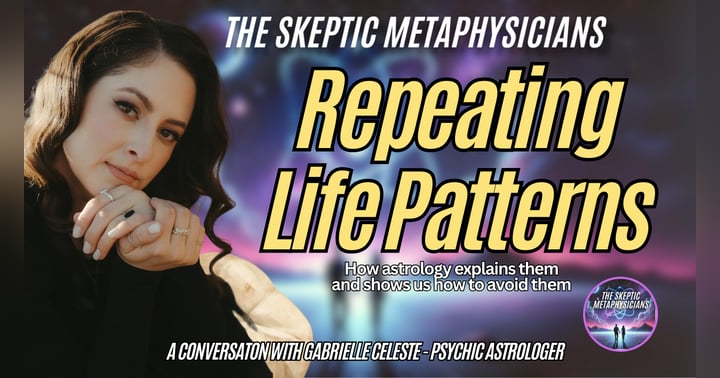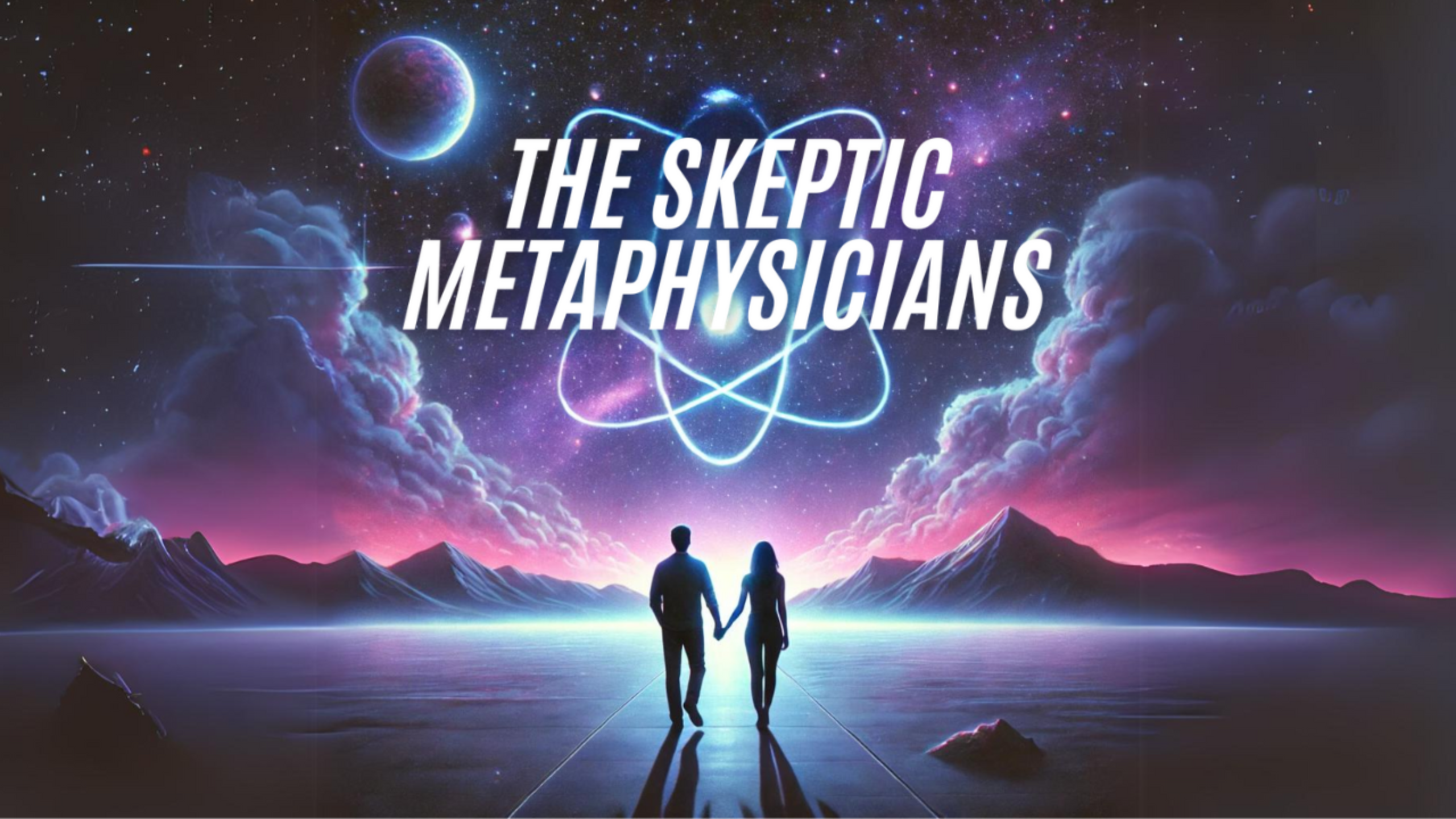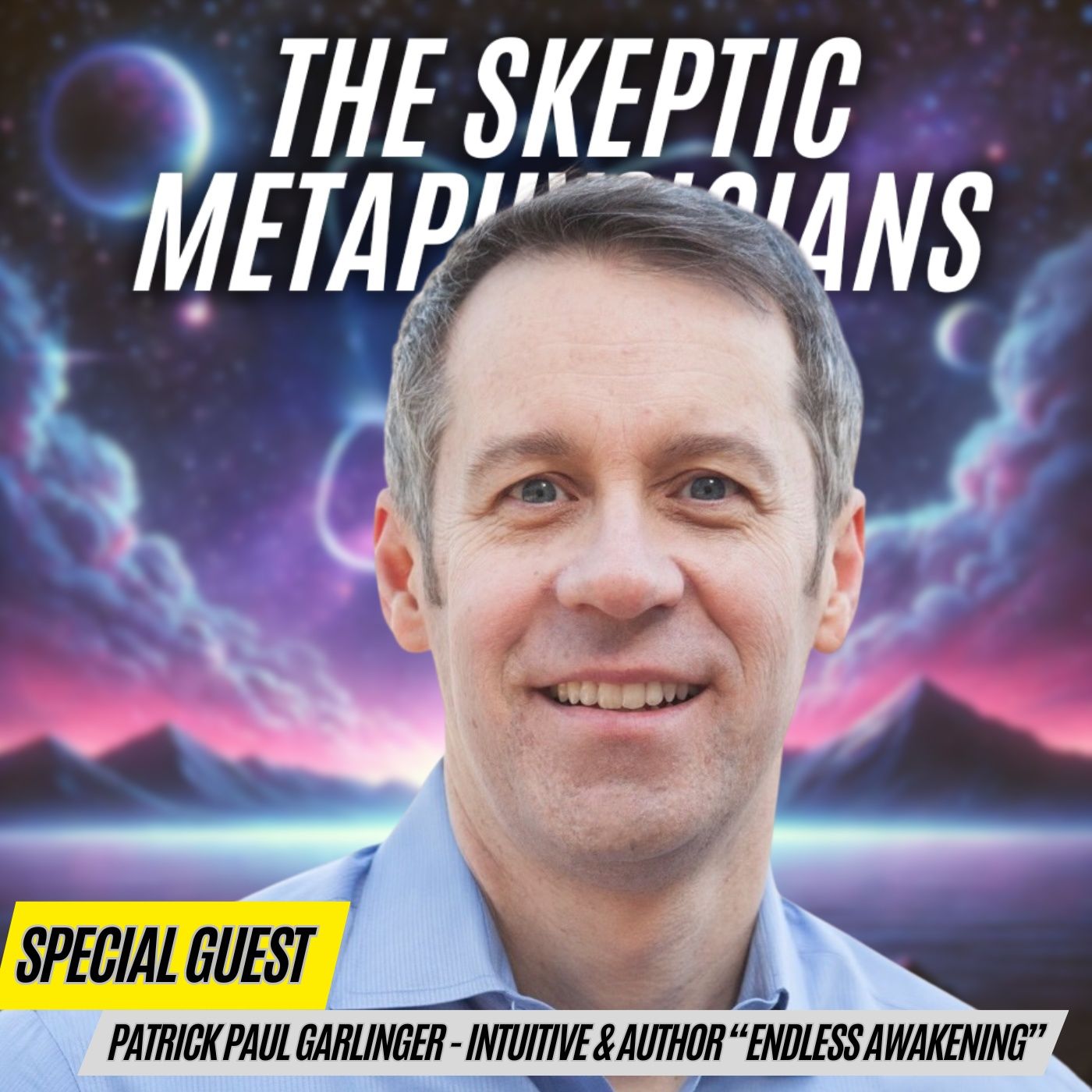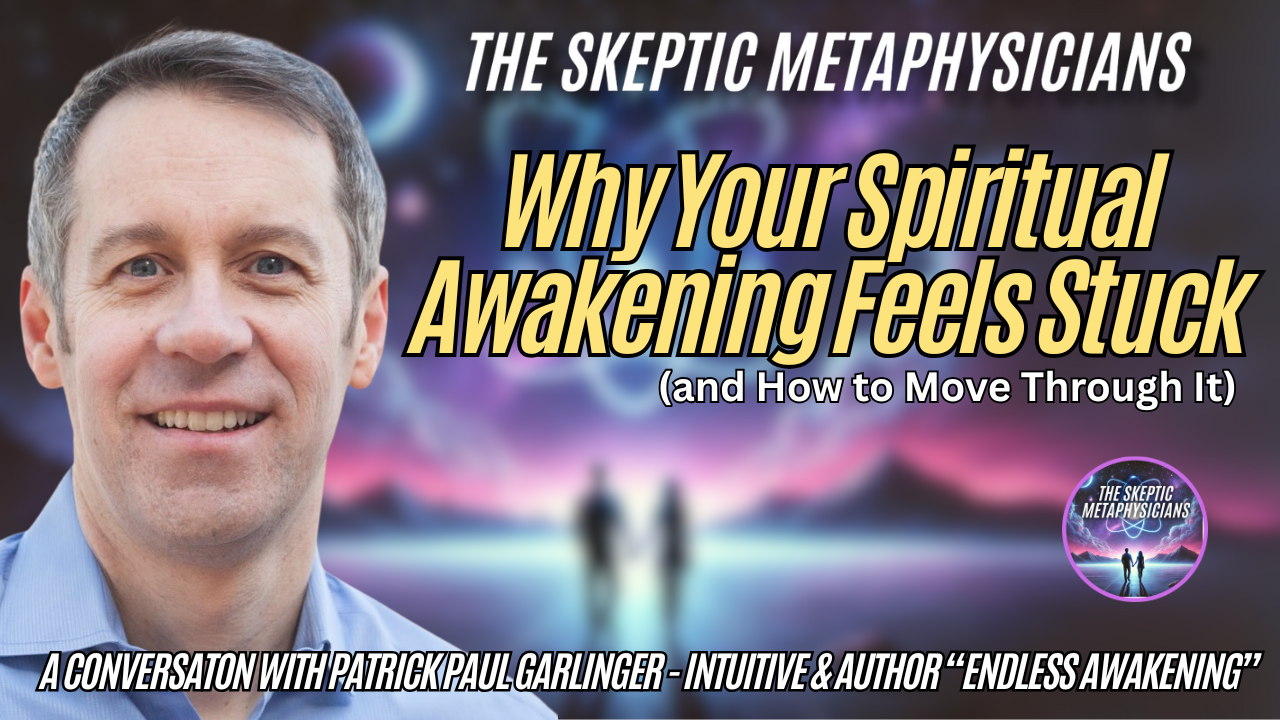
When you've been walking the spiritual path for years, attending workshops, reading books, and practicing meditation, you'd expect the journey to feel linear. Progress should build upon progress. Enlightenment should be within reach. But for many on the spiritual awakening journey, the reality is far more complex...and far more human...than the Instagram-worthy narratives suggest.
The truth that most spiritual teachers won't admit? They're stuck too.
This is a companion piece to the latest episode of The Skeptic Metaphysicians. Listen or watch the interview for more context.
The Myth of Continuous Progress
One of the most insidious traps in modern spirituality is the belief that once you experience awakening or a significant spiritual experience, you're supposed to move seamlessly into enlightenment. This narrative creates a false framework where seekers divide their lives into "before awakening" and "after awakening", assuming that everything after the awakening experience should be blissful, clear, and free from the human struggles that plagued them before.
This is where spiritual bypassing enters the picture, and it's where many devoted practitioners unknowingly sabotage their own growth.
Understanding Spiritual Bypassing
Spiritual bypassing occurs when we use spiritual practices, beliefs, or experiences to avoid dealing with uncomfortable emotions, trauma, or aspects of our humanity. It sounds counterintuitive; isn't spirituality supposed to help us transcend our problems?...but this common misunderstanding keeps thousands of seekers spinning their wheels.
When a challenging emotion surfaces, many spiritual practitioners immediately reach for their toolkit. They call upon their spirit guides, perform energy healing rituals, invoke archangels, or use manifestation techniques to "move it along" quickly. The urgency is understandable: who wants to sit with sadness, anger, or despair when they could transmute it?
But here's what rarely gets discussed: sometimes, that emotion simply needs to be felt.
A renowned spiritual teacher once found themselves trapped in weeks of depression during the pandemic. Despite accessing decades of spiritual practices...prayers, visualization techniques, energy work...nothing shifted the heaviness. It wasn't until they surrendered the need to "heal" it that something broke open. Sitting with the sadness, they eventually reached a place of profound weeping as a younger version of themselves emerged, a ten-year-old who was terrified during their parents' divorce, asking desperately, "Who is going to take care of me?"
That younger self didn't need an archangel intervention. It needed acknowledgment. It needed to be felt. It needed to matter.
The Human Condition Isn't a Bug, It's a Feature
One of the most liberating realizations for spiritual practitioners is this: we're all stuck. Even the most awakened teachers experience moments where old patterns resurface, where they feel disconnected, where they wonder if they're making progress at all.
The difference between those who continue evolving and those who stagnate isn't the absence of "stuckness." It's the relationship they have with it.
Many spiritual seekers come to their teachers or guides saying, "I'm stuck. I'm stuck. I'm stuck." Upon deeper listening, the real complaint emerges: "I shouldn't be going through this. I should be beyond this already. Why is this still happening to me?"
This should-ing is the actual trap. It creates a secondary layer of suffering on top of whatever legitimate challenge is present. Instead of simply feeling the difficulty, we layer judgment on top of it...judgment about ourselves for not being further along, about our practice not being "strong enough," about our spiritual identity being somehow compromised.
The path to moving through stuckness isn't about trying harder or applying more advanced techniques. It's about acceptance of where you actually are, combined with genuine emotional engagement with what's present.
The Paradox as a Path Forward
Spiritual awakening traditionally teaches us to transcend duality, move beyond ego, reach higher states of consciousness. But what if the faster path lies in embracing contradiction rather than resolving it?
In the spiritual framework of paradox, we learn to hold multiple mutually exclusive truths simultaneously:
-
You are whole AND still healing. These aren't sequential states; they're co-existing realities.
-
You are immortal AND mortal. Your consciousness is eternal while your physical form is temporary.
-
You are complete AND evolving. Wholeness doesn't mean static perfection.
-
You are doing nothing AND simultaneously putting in effort. The paradox of effortless effort.
This approach fundamentally shifts how we relate to our spiritual awakening journey. Instead of seeing ourselves as "broken people working to become enlightened," we recognize ourselves as whole beings in the process of deepening our connection to that wholeness.
When you judge yourself for not being nonjudgmental...when you get angry at yourself for still having anger...you've fallen into the trap that keeps so many seekers stuck in a loop of shame and spiritual perfectionism. But when you can say, "I hold multitudes. I am nonjudgmental and occasionally judgmental. I am conscious AND still learning," something shifts internally.
This isn't resignation. This is radical honesty, the foundation upon which genuine spiritual growth actually occurs.
The Secret Nobody Tells You About Inner Work
Here's what typically remains unspoken in spiritual circles: sometimes healing requires professional support that goes beyond your favorite spiritual modality.
A spiritual reader or intuitive guide might recognize that what someone is experiencing stems from deep trauma; childhood abuse, sexual assault, significant loss...and while identifying the root is valuable, actually processing that trauma might require working with a trauma-informed therapist. This isn't a failure of spirituality. It's wisdom.
The most evolved teachers understand this collaboration. They hold space for your emotional and spiritual experience while also having the discernment to recognize when someone needs specialized mental health support. Just as you might see a cardiologist for heart issues while also maintaining a yoga practice, you might work with both a therapist and a spiritual guide for comprehensive healing.
The other critical realization: everyone has layers. You might do years of inner work, experience profound breakthroughs, and then discover another layer waiting to be addressed. This isn't evidence that you've failed. It's evidence that you're actually doing the work, not just intellectually understanding it, but genuinely moving through it.
The Consciousness of Peace vs. The Absence of Conflict
Most conversations about peace equate it with the absence of conflict; a pause in war, a temporary ceasefire from struggle. But this definition has it backwards. Peace isn't something we create by eliminating external conflict. Peace is something we access by removing internal resistance.
True peace is a state of being where you recognize that whatever is happening right now is fundamentally okay, just as it is.
This doesn't mean you're satisfied with injustice or that you don't work toward improvement. It means you're not adding an additional layer of suffering through your relationship to what's happening. You can work for change from a place of centered purpose rather than from fear or desperation.
Here's a useful metaphor: consider high-quality audio. When the sound system is excellent, you don't notice it...you simply hear the content clearly. But when the audio is terrible, that's all you can focus on. Similarly, inner peace exists in the moments when you're not noticing it. It's when your general baseline feeling is, "My life is not under threat. My existence is not in jeopardy. These circumstances are manageable."
The moments when you run out of coffee and feel slightly annoyed? That's not evidence that you've lost your peace. That's evidence that you're human. The question is whether that minor annoyance is your baseline state or whether it's a ripple on an otherwise calm surface.
The Activist's Paradox: Can You Fight for Peace Without Creating More Conflict?
This is perhaps the most challenging territory for spiritually conscious people living in an increasingly polarized world. How do you maintain inner peace while witnessing suffering? How do you advocate for justice without falling into the us-versus-them mentality that creates the very divisions you're trying to heal?
The key lies in understanding that peace can coexist with other emotions and actions. You don't have to choose between being at peace and being passionately engaged with the world.
Where most activist movements fail, from a consciousness perspective, is when they identify an "other" as the source of the problem. That other might be a specific political party, a corporation, a nation, or a group of people. The fundamental belief becomes: "If only we could eliminate/defeat/convert them, everything would be better."
But this is precisely the consciousness structure that creates conflict in the first place. When any group operates from the belief that another group's existence is inherently threatening, conflict is inevitable. When both sides believe they're fighting for survival against an existential threat, escalation follows naturally.
The spiritual principle here is profound: the quality of consciousness that created a problem cannot be the consciousness that solves it. If conflict arises from seeing another as a threat, conflict cannot be resolved by that same threat-perceiving consciousness, only by a consciousness that recognizes the shared humanity and divine nature of all beings.
This doesn't mean becoming passive or accepting harmful systems. It means doing the inner work to understand why a difference (someone believes differently, looks differently, lives differently) triggers fear in you. What part of your own unlived life are you protecting? What belief about yourself feels threatened by their existence?
Finding Compassion Without Losing Discernment
Here's where paradox becomes essential again: you can hold boundaries AND compassion simultaneously. You can recognize that some worldviews are more aligned with respect and human dignity while also understanding that the people holding those views are frightened, often acting from ancestral programming or current survival fears.
You don't have to agree with someone to understand them. You don't have to accept harm to recognize the hurt underneath the perpetrator's actions. You can work toward systemic change while maintaining compassion for individual humans caught in those systems.
This is the path of the conscious activist, one who recognizes that outer transformation begins with inner transformation. You cannot create a more conscious culture while holding the reactive, fear-based consciousness that creates unconscious cultures.
Why Traditional "Manifestation" Teaching Often Backfires
One of the most common sources of spiritual anxiety is the teaching that "what you think about, you attract" or "if you feel it, you'll manifest it." Taken literally, this teaching creates a prison of hyper-vigilance where practitioners police every thought and emotion, terrified that a momentary fear will create their worst-case scenario.
Here's the more nuanced truth: Simply feeling an emotion doesn't manifest it. Believing it, nurturing it, holding onto it, and directing energy toward it...that's different.
If you feel afraid for a moment, that's just an emotion passing through your system. It's not quantum-physics-ing a catastrophe into existence. If you wake up anxious, feel it for an hour, then move on with your day, you're not manifesting that anxiety into your future.
But if you spend days telling yourself, "This is definitely going to happen. I just know it's coming. Everything always goes wrong for me," you're doing something very different. You're building a belief structure, directing mental and emotional energy, and unconsciously orienting your attention toward evidence that confirms your fear.
The spiritual teaching that got distorted is actually this: your dominant beliefs and the emotional energy behind them inform how you perceive, interpret, and respond to circumstances. So yes, someone operating from deep despair might unconsciously ignore opportunities or interpret setbacks as confirmation of their hopelessness, while someone operating from hope might see the same circumstances as information or temporary obstacles.
But this is psychology and neuroscience operating in partnership with consciousness, not magical thinking. Your thoughts and feelings shape your perception, your resilience, and your responses. They don't violate the laws of physics.
The Professional Path: Awakening While Maintaining Your Day Job
For decades, spiritual communities have perpetuated a limited vision: either you're "in the world" pursuing career success and material stability, or you're "on the path" pursuing spiritual development. The two were presented as mutually exclusive.
This binary is collapsing, and for good reason.
Increasing numbers of doctors, lawyers, therapists, engineers, business leaders, and corporate professionals are experiencing genuine spiritual awakening, and refusing to abandon their careers as a result. They're discovering that you can be deeply conscious and still enjoy professional success. You can honor your soul's purpose AND support your family financially. You can experience spiritual growth AND maintain your day job.
The real challenge these "covert mainstream" practitioners face isn't whether they should quit their careers to become yoga teachers or shamans. It's how to integrate their spiritual consciousness with their professional responsibilities. How do you maintain inner peace while working 12-hour days? How do you honor your spiritual awakening while navigating corporate culture?
This is where the inner work becomes truly practical. It's not about achieving some permanent state of enlightenment. It's about developing the psychological and spiritual capacity to function effectively in the material world, to understand that paying your bills isn't spiritual betrayal, it's wisdom. To recognize that maintaining professional relationships requires showing up as your professional self, while simultaneously doing deep inner work on your own time to process and transform what's being triggered.
The Path of Paradox in Professional Life
For the professional seeking to integrate their awakening, the framework of paradox becomes invaluable:
-
You are a successful professional AND a spiritual seeker
-
You are ambitious about your career AND focused on consciousness development
-
You are engaged with material concerns AND aligned with spiritual values
-
You are building something in the world AND cultivating inner emptiness
These aren't compromises or failures to "fully commit" to spirituality. These are the lived experience of spiritual maturity in the real world.
The Effortless Effort: The Paradox That Unlocks Your Path
Among all the insights that emerge from deep spiritual work, perhaps the most practically transformative is this: your path might require that you stop trying so hard.
This sounds deceptively simple and is often profoundly difficult to apply. Many seekers have built their entire identity around effort, discipline, and achievement. The idea that their path forward requires they do less feels counterintuitive.
Yet for some people, particularly those with strong achievement drives, their resistance, their very effort to "get somewhere" spiritually, is precisely what keeps them stuck.
Consider someone who has spent four decades trying to achieve astral projection. They've read the books, learned the techniques, created the intention, aligned with the goal. Nothing. Until the shift comes: "I don't need to get out of my body. I need to get out of my own way."
When that happens, the effort to try harder reverses into the effort of surrendering the trying. Not passivity, but release. Not giving up, but letting go of the death-grip on the outcome.
This is where Zen Buddhism becomes profoundly relevant. Zen strips away all the elaborate spiritual technology and returns you to the fundamental simplicity: what is already here? What is already true about this moment?
It's not that techniques are bad. It's that sometimes the technology becomes the obstacle. Like trying so hard to fall asleep that you guarantee insomnia, trying so hard to achieve spiritual experience often blocks it.
The path of simplicity...removing unnecessary effort, stopping when you're doing too much, recognizing that the answer is already inside...this is the path that opens when you stop fighting.
The Bridge Between Individual and Collective Awakening
We live in an age where collective suffering is impossible to ignore. The state of our world can feel overwhelming: polarization, climate disruption, institutional corruption, warfare, injustice.
For spiritually awakened people, this reality presents a profound question: Is individual inner peace selfish when the world is burning?
The answer requires understanding the causal chain between consciousness and manifestation in the material world.
When enough individuals develop genuine inner peace, not as spiritual escapism but as a deep recognition that they are part of a unified whole, that their consciousness is entangled with all consciousness, the field shifts. Not magically, but demonstrably.
People operating from wholeness and connection naturally create more coherent, compassionate systems. They make decisions from wisdom rather than fear. They build institutions that reflect their values. They solve problems from the consciousness that recognizes our interdependence rather than from the consciousness of separation and competition.
This doesn't mean meditating your way to world peace. It means recognizing that the transformation of culture happens through transformed individuals, and transformed individuals come from doing genuine inner work—not bypassing it.
What Awakening Actually Looks Like
If you've been picturing awakening as a one-time event after which everything is different, let go of that image. Awakening is better understood as an ongoing recalibration of consciousness, a deepening relationship with reality as it actually is rather than as your conditioned mind believes it to be.
You might experience a moment of awakening, a sudden recognition of interconnection, a dissolution of boundaries, a direct knowing that consciousness is fundamental. These moments are real and valuable. But awakening isn't primarily about dramatic experiences; it's about integrating those realizations into how you actually live.
The spiritual teacher who has experienced kundalini awakenings and states of samadhi and moments where their chakras light up? They still get frustrated sometimes. They still experience emotions. They still have to navigate the human condition. The difference is their relationship to these experiences, they're not surprised by their own humanity. They're not judging it as evidence of failed spirituality.
This is the mature spirituality that rarely gets marketed in books or workshop brochures: the recognition that awakening and being fully human aren't opposites.
The Reading: What Your Soul Wants You to Know
For those working with intuitive guidance or readings, a profound opportunity exists to receive reflection on where you actually are versus where you think you should be. When a skilled intuitive reads you, they're not predicting your future or validating your spiritual identity. They're providing a clear mirror: here's what I'm perceiving about your consciousness, your patterns, your path.
If a reading tells you that your path requires "no effort," that might feel contradictory, especially if effort is how you've built your life. But the message often carries truth: perhaps the effort you've been exerting comes from ego's insistence, from not trusting the natural unfolding, from trying to control a process meant to be surrendered to.
If a reading reflects back your old soul nature or your journey toward simplicity, consider whether these insights resonate with something you've known but haven't acted on. Many people come to readings seeking permission or confirmation to change their lives, to finally pursue what calls them, to let go of what no longer serves, to simplify and refocus on what matters.
The real work comes after the reading: the integration, the follow-through, the willingness to let your life reorganize around what you now recognize as true.
The Invitation: Your Path Awaits
The spiritual path isn't a destination where you finally arrive and everything becomes easy. It's a continuous deepening, a spiral where the same core lessons return at higher levels of understanding.
The question isn't "Am I doing it right?" The question is "Am I willing to actually feel my life rather than numb to it? Am I willing to do the uncomfortable inner work rather than spiritual bypass around it? Am I willing to hold paradoxes and mysteries rather than collapsing into premature certainty?"
For the professional seekers, the covert spiritual practitioners, the doctors and lawyers and engineers experiencing their own spiritual awakening, the invitation is clear: You don't have to choose between success and consciousness. You don't have to abandon your life to honor your soul. You can integrate it all.
The work is to develop consciousness in context, to discover who you are when you're not performing, who you become when you do your actual inner work, how your professional life and spiritual life can inform and enrich each other rather than compete.
This is the path of the modern spiritual practitioner: neither fully "in the world" nor fully withdrawn from it, but present to all of it. Acknowledging the shadow while moving toward the light. Feeling the difficulty while maintaining trust in the unfolding. Doing the work while letting go of the outcome.
This is the paradox of spiritual awakening. And this is precisely where your freedom lives.
For those seeking to integrate spiritual consciousness with professional life, community, guidance, and the kind of deep work that creates sustainable transformation, the opportunity to connect with experienced guides and fellow seekers now exists. The path awaits those ready to take it, not with grim determination, but with the understanding that sometimes the most powerful thing you can do is let go of trying so hard and trust what wants to unfold
Curious minds, meet your tribe. Every week on The Skeptic Metaphysicians, we dive into the mysteries of consciousness, spirituality, and the human experience, mixing humor, heart, and a healthy dose of wonder.
Don’t just scroll...evolve with us! Join Will and Karen on The Skeptic Metaphysicians for mind-bending conversations, laughter, and aha-moments you won’t forget.
Watch or listen wherever you get your podcasts, and don’t forget to subscribe to our newsletter for exclusive insights, behind-the-scenes stories, and inspiration to keep your vibe high between episodes.
Because awakening doesn’t have to be serious… it just has to be real.
